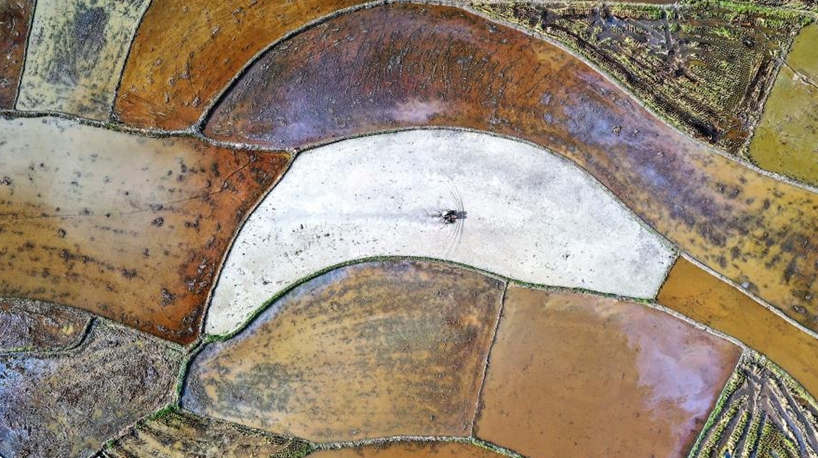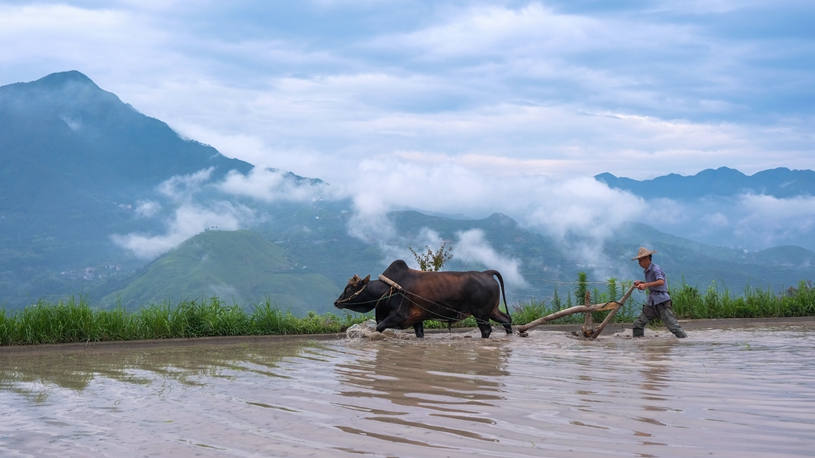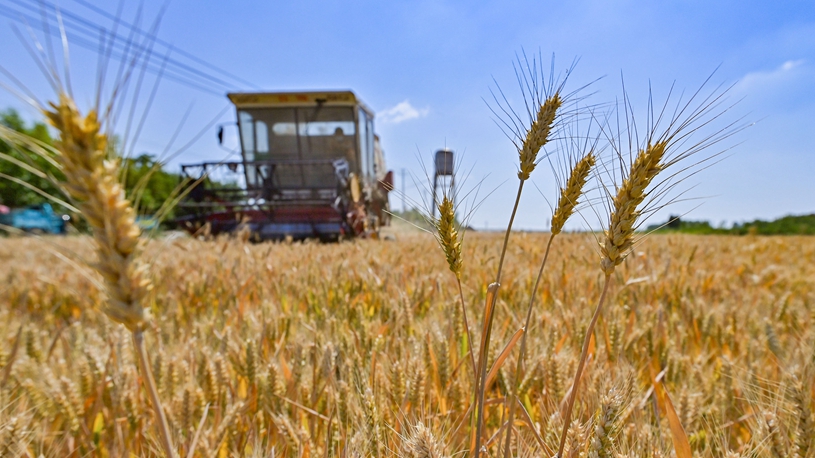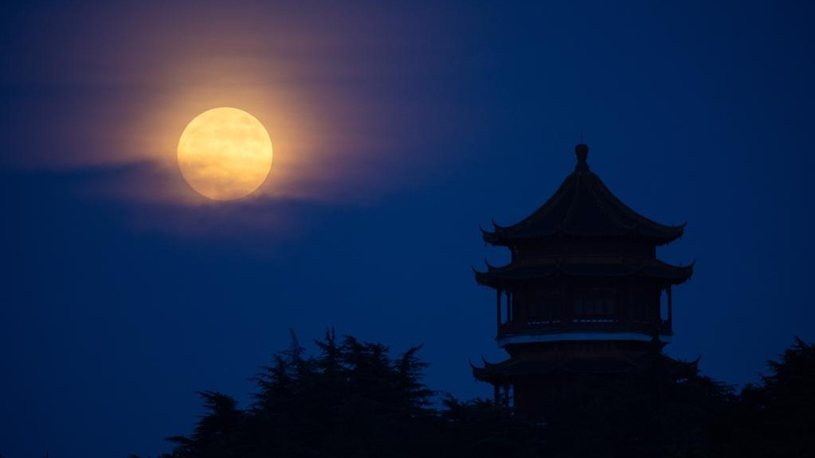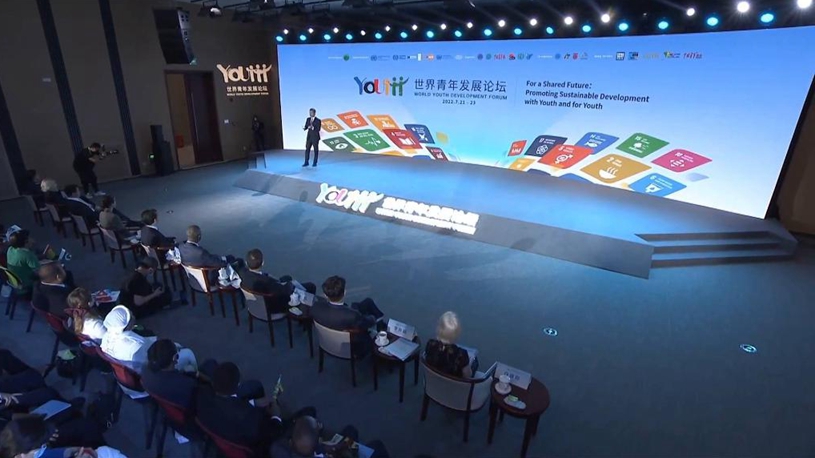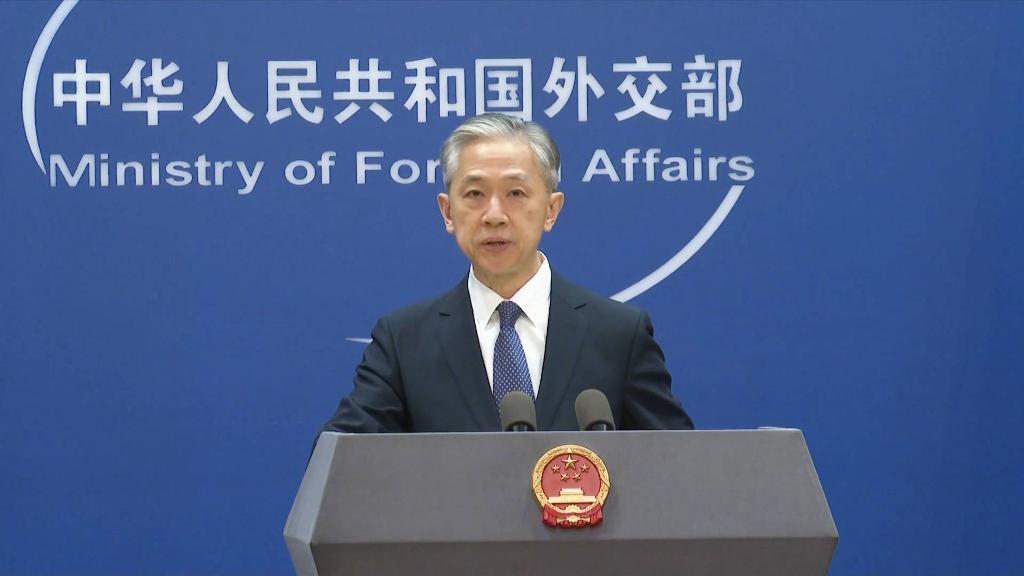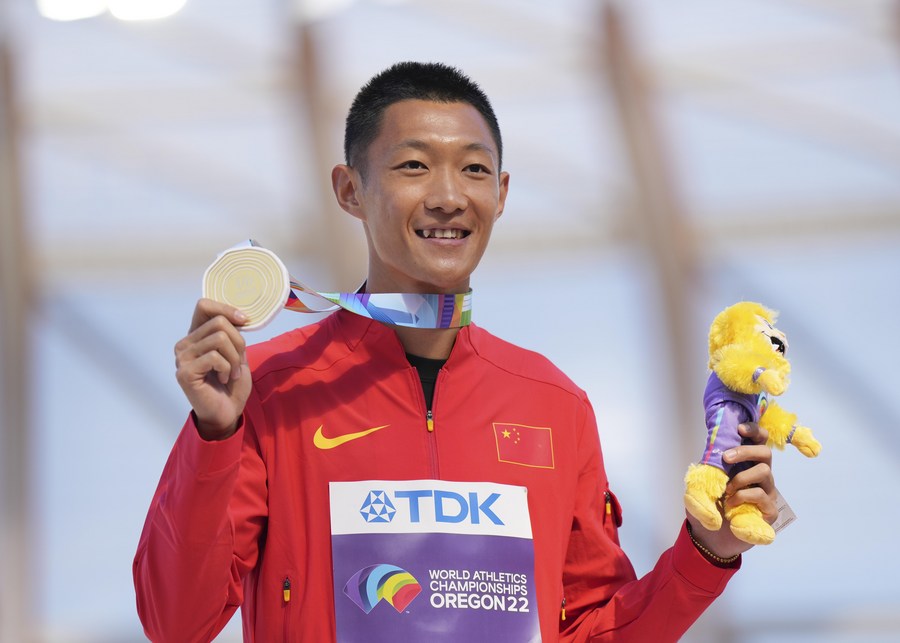
Gold medalist Wang Jianan of China poses during the medal ceremony for the men's long jump event at the World Athletics Championships Oregon22 in Eugene, Oregon, the United States, July 17, 2022. (Xinhua/Wang Ying)
U.S. coach Randy Huntington compares Wang Jianan's history-making jump to Mike Powell's record-breaking one in 1991 after Wang claimed China's first ever world title from the field events in the men's long jump at Oregon22.
by sportswriter Wang Zijiang
EUGENE, United States, July 23 (Xinhua) -- If there is a "Randy Ranking" for all his star-studded disciples, American track and field coach Randy Huntington said the newly-crowned Wang Jianan should be placed third, only after world record holders Mike Powell and Willie Banks.
Wang, who has been coached by Huntington for seven years, collected China's first ever world championship from the field events last Saturday, surging to victory in the men's long jump final with the last attempt of 8.36 meters.
"He is probably third," said Huntington in an interview with Xinhua. "It would be Mike in 8.95 and Banks going 18.20." Powell and Banks set world records in the long jump and triple jump, respectively, while under his tutelage. Six of his athletes have been in the U.S. all-time top ten in their respective events.

Wang Jianan of China competes during the men's long jump final at the World Athletics Championships Oregon22 in Eugene, Oregon, the United States, July 16, 2022. (Xinhua/Wu Xiaoling)
Wang gave Hungtington a big hug after the victory at Hayward Field of the University of Oregon. But it was the moment when Wang celebrated that brought Hungtington back to the night 31 years ago when Powell broke Bob Beamon's 23-year-old long jump record at the National Stadium in Tokyo.
"He came out of the pit, running down the whole track, just open his arms up. He did almost duplicate what Mike did in the 1991 world championships. It was fascinating."
Huntington, who turns 68 next week, said it was not a surprise for Wang, a bronze medalist at the 2015 Beijing worlds, to win the gold.
"No. I think he was capable of jumping 8.40 to 8.50 if the event was going on last year," he said. "After the qualifying round I told him, 'Eddie, you could win this thing.'" Eddie is Wang's English name.
"I told him, 'Eddie, this is your house, this is my house. Nobody beats you in our house.'"

Jianan Wang of China competes in the long jump during day three of the IAAF World Junior Championships at Hayward Field on July 24, 2014 in Eugene, Oregon. (Jonathan Ferrey/AFP)
Huntington earned a Bachelor of Science degree from the University of Oregon in 1982 and Wang won the long jump title at the 2014 world junior championships at the Hayward Field.
Wang is not the only star he has nurtured since joining the Chinese national team in 2013. The other one is sprinter Su Bingtian, who set an Asian record of 9.83 seconds and finished a historical eighth place in the men's 100m finals at last year's Tokyo Olympic Games.
"Jianan's gold medal is really close to Su's 9.83," he said. "They are very similar. Su's performance is better, but Jianan's result was a gold medal. We have to understand that when you go into world championships and the Olympic Games, you are there to win and to medal."
Su did not live up to expectations this time, failing to reach the finals, clocking 10.10 seconds in the first round and 10.30 in the semifinals.
But Huntington still believes that Su, who will be 33 in August, can run faster than 9.83.
"The first round was his first race of the year," he said. "You don't come to a world championship as bad as for the first race. It doesn't work. You don't have confidence then. But he can still run low 9.80s easily, for sure."
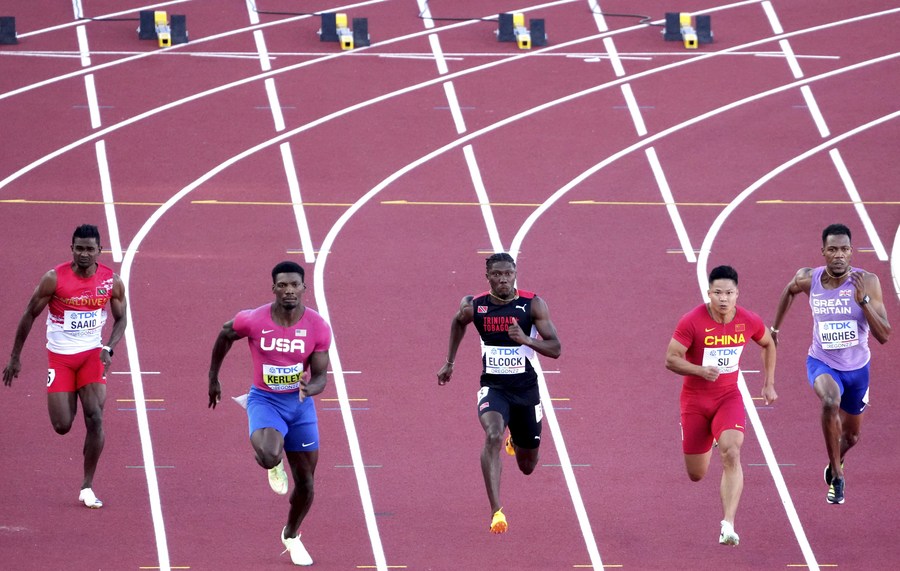
Su Bingtian (2nd R) of China competes during the men's 100m heat at the World Athletics Championships Oregon22 in Eugene, Oregon, the United States, July 15, 2022. (Xinhua/Wu Xiaoling)
He said Su, who has the highest stride frequency than anyone in the world, needs to improve his stride length.
"We know what the problem is, but partially solved the problem. The partial solution gets him to 9.83 and the full solution will get him to under 9.75."
The COVID-19 pandemic has kept Huntington away from China and he has stopped coaching Su since the end of the Tokyo Olympics.
Huntington was always critical of the Chinese coaching methods, which he thinks stopped young talents' growth to successful sprinters or jumpers.
"There are a lot of young talents in China," he said. "They are just stuck in the old training methods. That is why you can find a bunch of people running 10.40 or 10.30. Old training methods can get you there. If you want to get under 10.10 or 10.00, you need to change the training methods."
"The biggest problem with China right now in track and field, in the sprint and jump, is a lack of education," he added. "They (coaches) are not given the right information. When they do be given the right information, they say no and they are not right."
"The CAA (Chinese Athletics Association) needs to get all the coaches educated," he said. "They no longer give people degrees with no classroom. I want the coaches to be professional."
Huntington, one of only five coaches in his country to be rated as a USATF Master Coach in the jumps, said he is leaving the Chinese team for retirement.
"I will be retiring soon," He said. "I am 68. I have a mother to take care. I have some responsibility here in the U.S. that I have given up for nine years."
"I cannot continue. I can still help from distance. I just can't be in China full time."
He has never married and got no child, which he said he gave up for the coaching career.

Wang Jianan of China competes during the men's long jump qualification at the Tokyo 2020 Olympic Games in Tokyo, Japan, July 31, 2021. (Xinhua/Li Ming)
"That is the powerful drug that helps a person to achieve his dreams," he said. "That is what I do. You look at Jianan and his dream. This was beyond his dreams. I'm sure he could ever achieve this. For me what drives me is to help people reach their dreams."
But he has a dream that has still not been realized.
"Over all these years, I missed an Olympic gold medal." The closest moment was at the 1992 Barcelona Olympic Games, when Powell, who had won the silver in the 1998 Seoul Olympics, lost to Carl Lewis again in Barcelona by only three centimeters.
The same thing happened to Wang.
"Jianan should have won the gold at Rio in 2016," he said. "That was an optimistic goal. If he was healthy he could do this."


